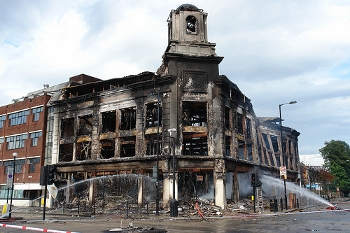 Saturday and Sunday saw large scale rioting in Tottenham as well as in other parts of the capital. Tony Travers argues that while these riots have been damaging in specific areas, if things remain calm, there is no need for over-reaction, or even for senior politicians to return from their summer holidays. It is for the Metropolitan police to deal with, and they must now tread very carefully and ensure they communicate very openly and closely with local communities.
Saturday and Sunday saw large scale rioting in Tottenham as well as in other parts of the capital. Tony Travers argues that while these riots have been damaging in specific areas, if things remain calm, there is no need for over-reaction, or even for senior politicians to return from their summer holidays. It is for the Metropolitan police to deal with, and they must now tread very carefully and ensure they communicate very openly and closely with local communities.
The major weekend disturbances in Tottenham, followed by smaller ones in Enfield, Brixton, Walthamstow, Islington and White City, have generated a massive “London’s Burning”-style media reaction. There can be no doubt the damage done along Tottenham High Road is very serious and that local people have suffered short and longer-term economic harm. But it would be wrong to over-react to these events. A period of calm inquiry, backed-up by effective and sensitive policing, is what should now take place.

First, the Independent Police Complaints Commission need to spell out how they will proceed with the investigation of the fatal shooting of Mark Duggan by Metropolitan Police officers on Thursday last week. It is clear that rumours and counter-rumours are creating an atmosphere of misinformation and mistrust in the streets of North London. There needs to be clear signposting of what will happen when and how the inquiry will take place. Mr Duggan’s relatives, in particular, need to be treated with dignity and respect.
Second, the police will need to summon up every extra officer they can and patrol suburban high streets on foot. The Met are prone to tear around the streets of the capital in cars and vans replete with screaming sirens, and/or to park helicopters in the sky over incidents. It is hard to believe that such policing contributes positively to public order.
Having said that, the police have been criticised for allowing looters to destroy shops and steal goods. The Met cannot win. On the one hand, they risk being seen as over-aggressive and provocative, while on the other they are criticised for holding back in case they are seen as insensitive. Senior officers will need to be very visible and to keep in contact with local community.
The issue of how the Metropolitan Police handles all of this is made more complicated because of the recent resignation of Sir Paul Stephenson as commissioner as an indirect consequence of the phone-hacking scandal. Tim Godwin, who is now acting commissioner, is experienced and highly-regarded. But there is no doubt the fall-out from the fatal shooting and the riots will apply significant further pressure on the London force. The fact that accountability for policing in London is shared between the Home Secretary, the Mayor, the Metropolitan Police Authority and the commissioner means it is hard to be entirely sure who is in charge. An additional worry is that if such an incident had happened next year at this time, we would be right in the middle of the Olympic Games.
Third, it is August, with Parliament in recess and many politicians on holiday. There have been calls for Home Secretary Theresa May, London mayor Boris Johnson and even the Prime Minister to rush back to London to ‘take charge’. Mrs May is, apparently, cutting her holiday short. There is a dilemma for senior politicians when it comes to reacting to events. 24-hour rolling news creates an expectation that the minister or the mayor will be on hand to be seen to be in charge. Yet, the police are responsible for operational policing decisions, not politicians. The Met are highly experienced at dealing with public order events. Moreover, by rushing back to London politicians risk giving the impression things are worse than they actually are. However bad things are for the people of Tottenham, 99 per cent of London is not affected by civil disorder. Local MPs David Lammy and Lynne Featherstone have been both visible and effective.
There was criticism last week when it turned out David Cameron, Nick Clegg and George Osborne were all out of the country at a time when the Eurozone and the United States were, it appeared, heading for economic catastrophe. But as William Hague pointed out mobile telephony has removed the need for senior politicians to be in London to make decisions. Nevertheless, there is still the symbolic issue of being seen to be at the centre of events during a crisis – in the way the Royal Family remained at Buckingham Palace during the Second World War.
If the city remains calm tonight (Monday/Tuesday) and beyond, the current sense of urgency will fade. Politicians who are on holiday will be able to stay there. But if there is any sense the civil disturbances are spreading or getting worse, it is almost inevitable the mayor and, eventually, the prime minister would have to return to London. It doesn’t matter what they can or cannot do, the public demand for someone visibly ‘in charge’ would become irresistible. Whatever happens next, Haringey Council will need assistance from the government and from City Hall, particularly in the form of resources to return Tottenham to normal, as quickly as possible.
Riots have been an inevitable, undesirable, feature of life in London over many centuries. This weekend has been a reminder of how much city-dwellers rely on the police, the fire brigade, ambulances and the local council for the network of services that make urban life possible. London neighbourhoods are amazingly resilient. Tottenham, Enfield, Brixton and Walthamstow will recover, though it will require good politics and public money to ensure this happens soon.
Please read our comments policy before posting.





Mr Travers says ’99 per cent of London is not affected by civil disorder’ which (if evidenced only by the range of blog comment here) seems way off the mark. More worryingly though this sentiment amplifies or reflects some of the factors underlying the recent and, to some extent, ongoing disturbances, not least the view that 1% of London can burn and 99% of the city remains unaffected.
Resilient neighbourhoods all? Belgravia, Dulwich Village, Crouch End?
Surely the sense of urgency he says will fade away is something we should capitalise on with a view towards a more durable solution than the recovery he alludes to in his closing comments.
Mr Travers assertion in his interview this evening when he said that no one could have predicted the present rioting, is not correct. Three years ago our son, a history graduate (MA Royal Holloway), told us on numerous occasions that there would be anarchy on the city streets of Britain in the not too distant future. We told him not to be so pessimistic. He closely followed the mood of the country and said that all the signs were there. Ironically, bankers’ bonuses, MPs expenses, rising house prices, as well as large classes in primary schools and recently MPs flaunting their overseas holidays, exemplifies the great divide in the country.